#The Balkan Wars
Explore tagged Tumblr posts
Photo

The Balkan Wars
Unraveling Aspirations and Shifting Alliances
Paving the Way for Conflict
As Bulgaria’s capital industry burgeoned, the need for trade outlets in the Aegean became apparent. Simultaneously, the people of Macedonia and Lower Thrace endured the enduring burden of Ottoman rule. In this complex landscape, a war seemed inevitable, driven by varied aspirations that momentarily converged on common goals.
War as a “Sacred Cause”
Post-insurrections and the attainment of state independence, the Bulgarian populace viewed war against Turkey as the sacred means to address the national question. This endeavor aimed to liberate compatriots in Macedonia and the Odrin region, offering a potential solution to their plight.
The Balkan Alliance Emerges
With the global powers teetering on the brink of a world war, the Triple Alliance and the Entente sought allies in the Balkans. The result was the formation of the Balkan Alliance under Russian patronage. This strategic coalition united Balkan Christian states against a still formidable Turkey and served as a tool for the Entente’s influence in the Peninsula Private Turkey Tours.
Exploiting Ottoman Weakness
Seizing the weakened state of the Ottoman Empire after its defeats in the war with Italy, the Bulgarian rulers, alongside Serbia, Greece, and later Montenegro, established the Balkan Entente in 1912. This alliance aimed to exploit the Ottoman Empire’s vulnerability.
Bulgarian-Serbian Treaty
The Bulgarian-Serbian Treaty, signed on February 29th, 1912, targeted Turkey and envisioned the division of future free Macedonia into two regions or zones. Bulgaria, assuming a pivotal role in the conflict, committed to deploying a substantial force and leading the war on the crucial Thracian front against the principal Turkish forces.
Challenges Within the Balkan Alliance
While the Balkan Alliance promised unity, it soon became evident that the union was fragile and temporary. Unresolved territorial issues created internal tensions. Bulgaria, undertaking significant responsibilities, found itself grappling with the explosive dynamics of conflicting interests within the alliance.
Prelude to Conflict
The Balkan Wars were not just battles on the Thracian front but also a complex interplay of shifting alliances, national aspirations, and geopolitical strategies. As Bulgaria assumed a central role, the stage was set for a conflict that would reshape the region’s political landscape.
0 notes
Photo

The Balkan Wars
Unraveling Aspirations and Shifting Alliances
Paving the Way for Conflict
As Bulgaria’s capital industry burgeoned, the need for trade outlets in the Aegean became apparent. Simultaneously, the people of Macedonia and Lower Thrace endured the enduring burden of Ottoman rule. In this complex landscape, a war seemed inevitable, driven by varied aspirations that momentarily converged on common goals.
War as a “Sacred Cause”
Post-insurrections and the attainment of state independence, the Bulgarian populace viewed war against Turkey as the sacred means to address the national question. This endeavor aimed to liberate compatriots in Macedonia and the Odrin region, offering a potential solution to their plight.
The Balkan Alliance Emerges
With the global powers teetering on the brink of a world war, the Triple Alliance and the Entente sought allies in the Balkans. The result was the formation of the Balkan Alliance under Russian patronage. This strategic coalition united Balkan Christian states against a still formidable Turkey and served as a tool for the Entente’s influence in the Peninsula Private Turkey Tours.
Exploiting Ottoman Weakness
Seizing the weakened state of the Ottoman Empire after its defeats in the war with Italy, the Bulgarian rulers, alongside Serbia, Greece, and later Montenegro, established the Balkan Entente in 1912. This alliance aimed to exploit the Ottoman Empire’s vulnerability.
Bulgarian-Serbian Treaty
The Bulgarian-Serbian Treaty, signed on February 29th, 1912, targeted Turkey and envisioned the division of future free Macedonia into two regions or zones. Bulgaria, assuming a pivotal role in the conflict, committed to deploying a substantial force and leading the war on the crucial Thracian front against the principal Turkish forces.
Challenges Within the Balkan Alliance
While the Balkan Alliance promised unity, it soon became evident that the union was fragile and temporary. Unresolved territorial issues created internal tensions. Bulgaria, undertaking significant responsibilities, found itself grappling with the explosive dynamics of conflicting interests within the alliance.
Prelude to Conflict
The Balkan Wars were not just battles on the Thracian front but also a complex interplay of shifting alliances, national aspirations, and geopolitical strategies. As Bulgaria assumed a central role, the stage was set for a conflict that would reshape the region’s political landscape.
0 notes
Photo

The Balkan Wars
Unraveling Aspirations and Shifting Alliances
Paving the Way for Conflict
As Bulgaria’s capital industry burgeoned, the need for trade outlets in the Aegean became apparent. Simultaneously, the people of Macedonia and Lower Thrace endured the enduring burden of Ottoman rule. In this complex landscape, a war seemed inevitable, driven by varied aspirations that momentarily converged on common goals.
War as a “Sacred Cause”
Post-insurrections and the attainment of state independence, the Bulgarian populace viewed war against Turkey as the sacred means to address the national question. This endeavor aimed to liberate compatriots in Macedonia and the Odrin region, offering a potential solution to their plight.
The Balkan Alliance Emerges
With the global powers teetering on the brink of a world war, the Triple Alliance and the Entente sought allies in the Balkans. The result was the formation of the Balkan Alliance under Russian patronage. This strategic coalition united Balkan Christian states against a still formidable Turkey and served as a tool for the Entente’s influence in the Peninsula Private Turkey Tours.
Exploiting Ottoman Weakness
Seizing the weakened state of the Ottoman Empire after its defeats in the war with Italy, the Bulgarian rulers, alongside Serbia, Greece, and later Montenegro, established the Balkan Entente in 1912. This alliance aimed to exploit the Ottoman Empire’s vulnerability.
Bulgarian-Serbian Treaty
The Bulgarian-Serbian Treaty, signed on February 29th, 1912, targeted Turkey and envisioned the division of future free Macedonia into two regions or zones. Bulgaria, assuming a pivotal role in the conflict, committed to deploying a substantial force and leading the war on the crucial Thracian front against the principal Turkish forces.
Challenges Within the Balkan Alliance
While the Balkan Alliance promised unity, it soon became evident that the union was fragile and temporary. Unresolved territorial issues created internal tensions. Bulgaria, undertaking significant responsibilities, found itself grappling with the explosive dynamics of conflicting interests within the alliance.
Prelude to Conflict
The Balkan Wars were not just battles on the Thracian front but also a complex interplay of shifting alliances, national aspirations, and geopolitical strategies. As Bulgaria assumed a central role, the stage was set for a conflict that would reshape the region’s political landscape.
0 notes
Photo

The Balkan Wars
Unraveling Aspirations and Shifting Alliances
Paving the Way for Conflict
As Bulgaria’s capital industry burgeoned, the need for trade outlets in the Aegean became apparent. Simultaneously, the people of Macedonia and Lower Thrace endured the enduring burden of Ottoman rule. In this complex landscape, a war seemed inevitable, driven by varied aspirations that momentarily converged on common goals.
War as a “Sacred Cause”
Post-insurrections and the attainment of state independence, the Bulgarian populace viewed war against Turkey as the sacred means to address the national question. This endeavor aimed to liberate compatriots in Macedonia and the Odrin region, offering a potential solution to their plight.
The Balkan Alliance Emerges
With the global powers teetering on the brink of a world war, the Triple Alliance and the Entente sought allies in the Balkans. The result was the formation of the Balkan Alliance under Russian patronage. This strategic coalition united Balkan Christian states against a still formidable Turkey and served as a tool for the Entente’s influence in the Peninsula Private Turkey Tours.
Exploiting Ottoman Weakness
Seizing the weakened state of the Ottoman Empire after its defeats in the war with Italy, the Bulgarian rulers, alongside Serbia, Greece, and later Montenegro, established the Balkan Entente in 1912. This alliance aimed to exploit the Ottoman Empire’s vulnerability.
Bulgarian-Serbian Treaty
The Bulgarian-Serbian Treaty, signed on February 29th, 1912, targeted Turkey and envisioned the division of future free Macedonia into two regions or zones. Bulgaria, assuming a pivotal role in the conflict, committed to deploying a substantial force and leading the war on the crucial Thracian front against the principal Turkish forces.
Challenges Within the Balkan Alliance
While the Balkan Alliance promised unity, it soon became evident that the union was fragile and temporary. Unresolved territorial issues created internal tensions. Bulgaria, undertaking significant responsibilities, found itself grappling with the explosive dynamics of conflicting interests within the alliance.
Prelude to Conflict
The Balkan Wars were not just battles on the Thracian front but also a complex interplay of shifting alliances, national aspirations, and geopolitical strategies. As Bulgaria assumed a central role, the stage was set for a conflict that would reshape the region’s political landscape.
0 notes
Photo

The Balkan Wars
Unraveling Aspirations and Shifting Alliances
Paving the Way for Conflict
As Bulgaria’s capital industry burgeoned, the need for trade outlets in the Aegean became apparent. Simultaneously, the people of Macedonia and Lower Thrace endured the enduring burden of Ottoman rule. In this complex landscape, a war seemed inevitable, driven by varied aspirations that momentarily converged on common goals.
War as a “Sacred Cause”
Post-insurrections and the attainment of state independence, the Bulgarian populace viewed war against Turkey as the sacred means to address the national question. This endeavor aimed to liberate compatriots in Macedonia and the Odrin region, offering a potential solution to their plight.
The Balkan Alliance Emerges
With the global powers teetering on the brink of a world war, the Triple Alliance and the Entente sought allies in the Balkans. The result was the formation of the Balkan Alliance under Russian patronage. This strategic coalition united Balkan Christian states against a still formidable Turkey and served as a tool for the Entente’s influence in the Peninsula Private Turkey Tours.
Exploiting Ottoman Weakness
Seizing the weakened state of the Ottoman Empire after its defeats in the war with Italy, the Bulgarian rulers, alongside Serbia, Greece, and later Montenegro, established the Balkan Entente in 1912. This alliance aimed to exploit the Ottoman Empire’s vulnerability.
Bulgarian-Serbian Treaty
The Bulgarian-Serbian Treaty, signed on February 29th, 1912, targeted Turkey and envisioned the division of future free Macedonia into two regions or zones. Bulgaria, assuming a pivotal role in the conflict, committed to deploying a substantial force and leading the war on the crucial Thracian front against the principal Turkish forces.
Challenges Within the Balkan Alliance
While the Balkan Alliance promised unity, it soon became evident that the union was fragile and temporary. Unresolved territorial issues created internal tensions. Bulgaria, undertaking significant responsibilities, found itself grappling with the explosive dynamics of conflicting interests within the alliance.
Prelude to Conflict
The Balkan Wars were not just battles on the Thracian front but also a complex interplay of shifting alliances, national aspirations, and geopolitical strategies. As Bulgaria assumed a central role, the stage was set for a conflict that would reshape the region’s political landscape.
0 notes
Photo

The Balkan Wars
Unraveling Aspirations and Shifting Alliances
Paving the Way for Conflict
As Bulgaria’s capital industry burgeoned, the need for trade outlets in the Aegean became apparent. Simultaneously, the people of Macedonia and Lower Thrace endured the enduring burden of Ottoman rule. In this complex landscape, a war seemed inevitable, driven by varied aspirations that momentarily converged on common goals.
War as a “Sacred Cause”
Post-insurrections and the attainment of state independence, the Bulgarian populace viewed war against Turkey as the sacred means to address the national question. This endeavor aimed to liberate compatriots in Macedonia and the Odrin region, offering a potential solution to their plight.
The Balkan Alliance Emerges
With the global powers teetering on the brink of a world war, the Triple Alliance and the Entente sought allies in the Balkans. The result was the formation of the Balkan Alliance under Russian patronage. This strategic coalition united Balkan Christian states against a still formidable Turkey and served as a tool for the Entente’s influence in the Peninsula Private Turkey Tours.
Exploiting Ottoman Weakness
Seizing the weakened state of the Ottoman Empire after its defeats in the war with Italy, the Bulgarian rulers, alongside Serbia, Greece, and later Montenegro, established the Balkan Entente in 1912. This alliance aimed to exploit the Ottoman Empire’s vulnerability.
Bulgarian-Serbian Treaty
The Bulgarian-Serbian Treaty, signed on February 29th, 1912, targeted Turkey and envisioned the division of future free Macedonia into two regions or zones. Bulgaria, assuming a pivotal role in the conflict, committed to deploying a substantial force and leading the war on the crucial Thracian front against the principal Turkish forces.
Challenges Within the Balkan Alliance
While the Balkan Alliance promised unity, it soon became evident that the union was fragile and temporary. Unresolved territorial issues created internal tensions. Bulgaria, undertaking significant responsibilities, found itself grappling with the explosive dynamics of conflicting interests within the alliance.
Prelude to Conflict
The Balkan Wars were not just battles on the Thracian front but also a complex interplay of shifting alliances, national aspirations, and geopolitical strategies. As Bulgaria assumed a central role, the stage was set for a conflict that would reshape the region’s political landscape.
0 notes
Photo

The Balkan Wars
Unraveling Aspirations and Shifting Alliances
Paving the Way for Conflict
As Bulgaria’s capital industry burgeoned, the need for trade outlets in the Aegean became apparent. Simultaneously, the people of Macedonia and Lower Thrace endured the enduring burden of Ottoman rule. In this complex landscape, a war seemed inevitable, driven by varied aspirations that momentarily converged on common goals.
War as a “Sacred Cause”
Post-insurrections and the attainment of state independence, the Bulgarian populace viewed war against Turkey as the sacred means to address the national question. This endeavor aimed to liberate compatriots in Macedonia and the Odrin region, offering a potential solution to their plight.
The Balkan Alliance Emerges
With the global powers teetering on the brink of a world war, the Triple Alliance and the Entente sought allies in the Balkans. The result was the formation of the Balkan Alliance under Russian patronage. This strategic coalition united Balkan Christian states against a still formidable Turkey and served as a tool for the Entente’s influence in the Peninsula Private Turkey Tours.
Exploiting Ottoman Weakness
Seizing the weakened state of the Ottoman Empire after its defeats in the war with Italy, the Bulgarian rulers, alongside Serbia, Greece, and later Montenegro, established the Balkan Entente in 1912. This alliance aimed to exploit the Ottoman Empire’s vulnerability.
Bulgarian-Serbian Treaty
The Bulgarian-Serbian Treaty, signed on February 29th, 1912, targeted Turkey and envisioned the division of future free Macedonia into two regions or zones. Bulgaria, assuming a pivotal role in the conflict, committed to deploying a substantial force and leading the war on the crucial Thracian front against the principal Turkish forces.
Challenges Within the Balkan Alliance
While the Balkan Alliance promised unity, it soon became evident that the union was fragile and temporary. Unresolved territorial issues created internal tensions. Bulgaria, undertaking significant responsibilities, found itself grappling with the explosive dynamics of conflicting interests within the alliance.
Prelude to Conflict
The Balkan Wars were not just battles on the Thracian front but also a complex interplay of shifting alliances, national aspirations, and geopolitical strategies. As Bulgaria assumed a central role, the stage was set for a conflict that would reshape the region’s political landscape.
0 notes
Photo

The Balkan Wars
Unraveling Aspirations and Shifting Alliances
Paving the Way for Conflict
As Bulgaria’s capital industry burgeoned, the need for trade outlets in the Aegean became apparent. Simultaneously, the people of Macedonia and Lower Thrace endured the enduring burden of Ottoman rule. In this complex landscape, a war seemed inevitable, driven by varied aspirations that momentarily converged on common goals.
War as a “Sacred Cause”
Post-insurrections and the attainment of state independence, the Bulgarian populace viewed war against Turkey as the sacred means to address the national question. This endeavor aimed to liberate compatriots in Macedonia and the Odrin region, offering a potential solution to their plight.
The Balkan Alliance Emerges
With the global powers teetering on the brink of a world war, the Triple Alliance and the Entente sought allies in the Balkans. The result was the formation of the Balkan Alliance under Russian patronage. This strategic coalition united Balkan Christian states against a still formidable Turkey and served as a tool for the Entente’s influence in the Peninsula Private Turkey Tours.
Exploiting Ottoman Weakness
Seizing the weakened state of the Ottoman Empire after its defeats in the war with Italy, the Bulgarian rulers, alongside Serbia, Greece, and later Montenegro, established the Balkan Entente in 1912. This alliance aimed to exploit the Ottoman Empire’s vulnerability.
Bulgarian-Serbian Treaty
The Bulgarian-Serbian Treaty, signed on February 29th, 1912, targeted Turkey and envisioned the division of future free Macedonia into two regions or zones. Bulgaria, assuming a pivotal role in the conflict, committed to deploying a substantial force and leading the war on the crucial Thracian front against the principal Turkish forces.
Challenges Within the Balkan Alliance
While the Balkan Alliance promised unity, it soon became evident that the union was fragile and temporary. Unresolved territorial issues created internal tensions. Bulgaria, undertaking significant responsibilities, found itself grappling with the explosive dynamics of conflicting interests within the alliance.
Prelude to Conflict
The Balkan Wars were not just battles on the Thracian front but also a complex interplay of shifting alliances, national aspirations, and geopolitical strategies. As Bulgaria assumed a central role, the stage was set for a conflict that would reshape the region’s political landscape.
0 notes
Photo

The Balkan Wars
Unraveling Aspirations and Shifting Alliances
Paving the Way for Conflict
As Bulgaria’s capital industry burgeoned, the need for trade outlets in the Aegean became apparent. Simultaneously, the people of Macedonia and Lower Thrace endured the enduring burden of Ottoman rule. In this complex landscape, a war seemed inevitable, driven by varied aspirations that momentarily converged on common goals.
War as a “Sacred Cause”
Post-insurrections and the attainment of state independence, the Bulgarian populace viewed war against Turkey as the sacred means to address the national question. This endeavor aimed to liberate compatriots in Macedonia and the Odrin region, offering a potential solution to their plight.
The Balkan Alliance Emerges
With the global powers teetering on the brink of a world war, the Triple Alliance and the Entente sought allies in the Balkans. The result was the formation of the Balkan Alliance under Russian patronage. This strategic coalition united Balkan Christian states against a still formidable Turkey and served as a tool for the Entente’s influence in the Peninsula Private Turkey Tours.
Exploiting Ottoman Weakness
Seizing the weakened state of the Ottoman Empire after its defeats in the war with Italy, the Bulgarian rulers, alongside Serbia, Greece, and later Montenegro, established the Balkan Entente in 1912. This alliance aimed to exploit the Ottoman Empire’s vulnerability.
Bulgarian-Serbian Treaty
The Bulgarian-Serbian Treaty, signed on February 29th, 1912, targeted Turkey and envisioned the division of future free Macedonia into two regions or zones. Bulgaria, assuming a pivotal role in the conflict, committed to deploying a substantial force and leading the war on the crucial Thracian front against the principal Turkish forces.
Challenges Within the Balkan Alliance
While the Balkan Alliance promised unity, it soon became evident that the union was fragile and temporary. Unresolved territorial issues created internal tensions. Bulgaria, undertaking significant responsibilities, found itself grappling with the explosive dynamics of conflicting interests within the alliance.
Prelude to Conflict
The Balkan Wars were not just battles on the Thracian front but also a complex interplay of shifting alliances, national aspirations, and geopolitical strategies. As Bulgaria assumed a central role, the stage was set for a conflict that would reshape the region’s political landscape.
0 notes
Text
New Post has been published on Mirela
The Balkan Wars
Unraveling Aspirations and Shifting Alliances
Paving the Way for Conflict
As Bulgaria’s capital industry burgeoned, the need for trade outlets in the Aegean became apparent. Simultaneously, the people of Macedonia and Lower Thrace endured the enduring burden of Ottoman rule. In this complex landscape, a war seemed inevitable, driven by varied aspirations that momentarily converged on common goals.
War as a “Sacred Cause”
Post-insurrections and the attainment of state independence, the Bulgarian populace viewed war against Turkey as the sacred means to address the national question. This endeavor aimed to liberate compatriots in Macedonia and the Odrin region, offering a potential solution to their plight.
The Balkan Alliance Emerges
With the global powers teetering on the brink of a world war, the Triple Alliance and the Entente sought allies in the Balkans. The result was the formation of the Balkan Alliance under Russian patronage. This strategic coalition united Balkan Christian states against a still formidable Turkey and served as a tool for the Entente’s influence in the Peninsula Private Turkey Tours.
Exploiting Ottoman Weakness
Seizing the weakened state of the Ottoman Empire after its defeats in the war with Italy, the Bulgarian rulers, alongside Serbia, Greece, and later Montenegro, established the Balkan Entente in 1912. This alliance aimed to exploit the Ottoman Empire’s vulnerability.
Bulgarian-Serbian Treaty
The Bulgarian-Serbian Treaty, signed on February 29th, 1912, targeted Turkey and envisioned the division of future free Macedonia into two regions or zones. Bulgaria, assuming a pivotal role in the conflict, committed to deploying a substantial force and leading the war on the crucial Thracian front against the principal Turkish forces.
Challenges Within the Balkan Alliance
While the Balkan Alliance promised unity, it soon became evident that the union was fragile and temporary. Unresolved territorial issues created internal tensions. Bulgaria, undertaking significant responsibilities, found itself grappling with the explosive dynamics of conflicting interests within the alliance.
Prelude to Conflict
The Balkan Wars were not just battles on the Thracian front but also a complex interplay of shifting alliances, national aspirations, and geopolitical strategies. As Bulgaria assumed a central role, the stage was set for a conflict that would reshape the region’s political landscape.
0 notes
Text

A-10 Warthog
@AcePilotAV via X
#a 10 warthog#republic aviation#fighter bomber#gunfighter#aircraft#usaf#aviation#cold war aircraft#gulf war aircraft#Balkans war aircraft#Afghanistan war aircraft#syrian civil war
173 notes
·
View notes
Photo

Balkans Before and After the 1877-78 Russo-Turkish war
Note: V-r in the "belligerents" section stands for volunteers.
by mapsenthusiast/instagram
97 notes
·
View notes
Text
Letter sent by Greek general Georgios Karaiskakis to Ottoman sultan Reşid Mehmed Pasha

To Reşid Mehmed Pasha, Kütahı in Athens
Fuck your faith and your Muhammed
What do you think you’re doing cuckholds….Don’t have no shame asking us to negotiate with a kodja shit sultan.
Mehmedite?
Let me shit on him, and your vizer, and that Jew Silihtar Boda, that bitch
If I live, I will fuck them, and if I die, they will fart on my dick.
The General
Georgios Karaiskakis
20 April 1827
#what did bro do#greek posts#greek tumblr#greek quotes#greek history#ottoman#ottoman empire#history#greece#turkey#turkiye#turkish#balkan#1800s#historical#artifact#hellenic#turkic#war
63 notes
·
View notes
Text
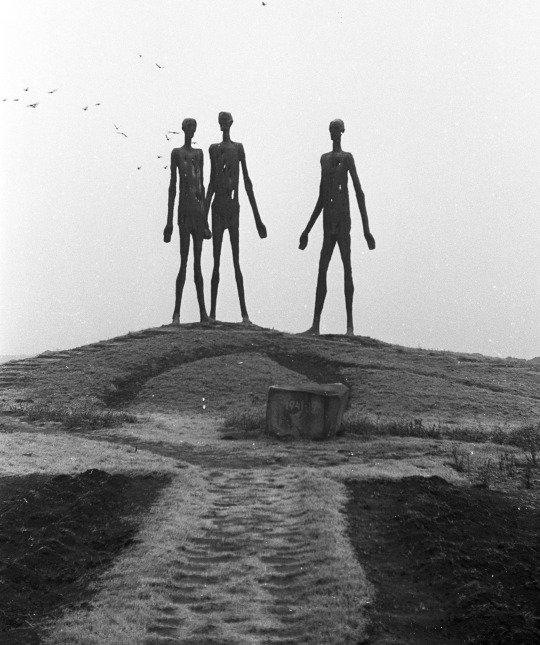
Memorial to the victims of the Novi Sad massacre, Serbia, 1968.
(Fortepan)
313 notes
·
View notes
Text

5th (Scots) Parachute Battalion, 2nd Parachute Brigade, Athens, Greece. 6 December 1944
31 notes
·
View notes
Text
Milunka Savić, the Most Decorated Female Combatant in History: Savić disguised herself as a man in order to join the Serbian army during the Balkan Wars, then served again during WWI, earning medals from Serbia, France, Russia & Britain; she also provided medical support to anti-fascists during WWII and spent 10 months in a Nazi concentration camp
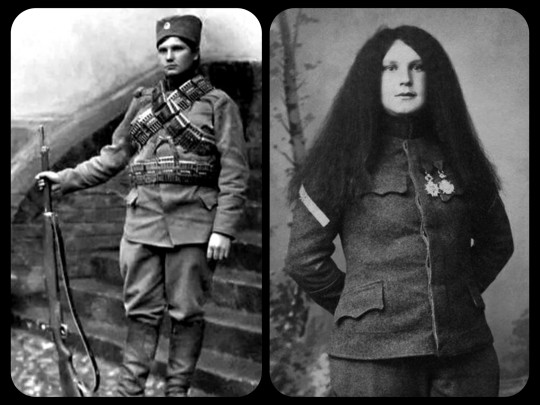
This is a total rewrite of a post that I did last year, with much more detailed information, more photos, and some additional sources.
Milunka Savić is regarded as the most decorated female combatant in history. She fought for the Serbian Army during both of the Balkan Wars, before returning to the battlefield again during WWI. Savić was wounded in battle on 9 separate occasions and survived the Serbian Great Retreat, making the perilous journey across the mountains of Montenegro and Albania through the dead of winter with a serious head injury.
Her military career began during the First Balkan War in 1912, when her younger brother was called up to serve in the Serbian army, and she decided that she would covertly take his place. She cut her hair, wore men's clothing, and presented herself as her brother.
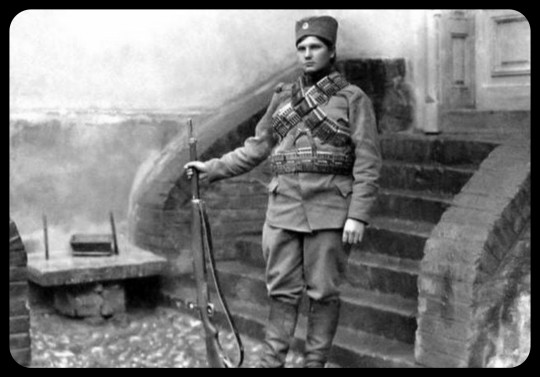
The First Balkan War, 1912: Milunka Savić as a young soldier during the First Balkan War, shortly after joining the Serbian army
She was able to hide her true identity for quite some time. Her skills as a soldier quickly became evident as the war progressed, and she earned her first medal/promotion during the Battle of Bregalnica in 1913. Unfortunately, she was hit by shrapnel from a Bulgarian grenade during her tenth deployment, causing injuries to her chest and abdomen, and those wounds (along with the subsequent medical treatment) ultimately led to the discovery that she had lied about her identity.
In recognition of her accomplishments on the battlefield, her commanding officer decided not to punish her for the initial deception, but informed her that she would not be allowed to return to combat -- as a woman, she could only be transferred to the nursing division instead.
As the story goes:
Savić was called before her commanding officer. They didn't want to punish her, because she had proven a valuable and highly competent soldier, and the military deployment that had resulted in her [sex] being revealed had been her tenth; but neither was it suitable for a young woman to serve in combat. She was offered a transfer to the Nursing division. Savić stood at attention and insisted that she only wanted to fight for her country as a combatant.
The officer said he'd think it over and give her his answer the next day. Still standing at attention, Savić responded, "I will wait." It is said he only made her stand an hour before agreeing to send her back to the infantry.
Savić was able to serve in a combat role throughout the remainder of the Balkan Wars.
The Second Balkan War finally came to an end in 1913, but that peace was short-lived, as World War I erupted just a year later. Savić returned to the military once more, serving in the elite "Iron Regiment" of the Serbian army.
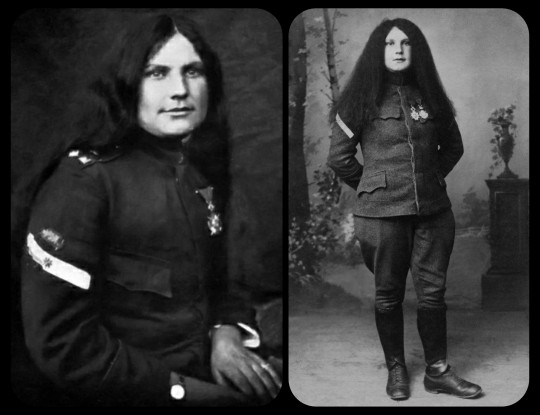
World War I, c.1915-1916: Savić was no longer forced to hide her identity when she returned to battle during WWI, and these images show her posing in uniform with her hair grown out
Savić received the Serbian Karađorđe Star with Swords medal on two separate occasions during WWI; the second medal was given to her after the Battle of Crna Bend in 1916, where she was credited with single-handedly capturing 23 Bulgarian soldiers. She received several other medals throughout the course of her career, including the French Legion of Honor (twice), the French Croix de Guerre, the Russian Cross of St. George, the British Medal of the Most Distinguished Order of St. Michael, and the Serbian Miloš Obilić.
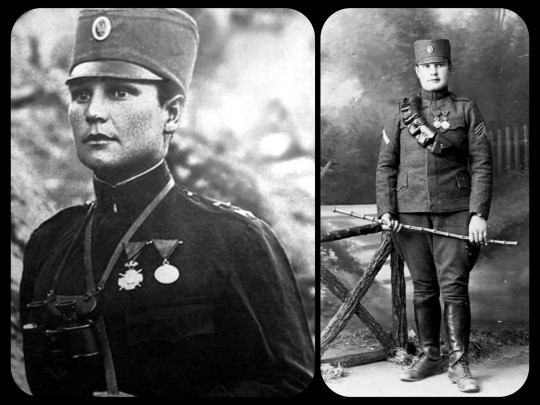
WWI, c.1915-1916: Milunka Savić as a Corporal in the Iron Regiment
She suffered a serious head injury while fighting along the Macedonian front, and she was still gravely wounded when Austro-Hungarian, German, and Bulgarian forces gained control of Serbia in the winter of 1915. The Serbian army was then ordered to make a full retreat from Serbia; Savić and her fellow soldiers, along with the Serbian government and more than 200,000 civilians, were all forced to flee through the mountains of Montenegro and Albania in the dead of winter, hoping to reach Allied forces along the Adriatic Coast -- a perilous journey that would later be known as the Serbian Great Retreat (or the Albanian Golgotha). Roughly 400,000 people embarked on this journey, and less than 180,000 of them survived, eventually reaching the Allied ships along the Adriatic coast.
Despite her injuries, Milunka Savić was among the survivors. She was sent to an infirmary, where she spent several months recovering from her injuries, before she returned to the battlefield alongside Allied forces.
At the end of the war, the French government offered to provide Savić with a full pension and living accommodations in France, in recognition of her actions while serving alongside the French military during WWI. She ultimately declined the offer and chose to retire back in Serbia instead, where she and her husband settled down to raise their daughter and three other girls that Milunka had adopted. The couple would later separate, however, and Milunka was left to raise her children as a single mother, working at a local bank to make ends meet.
In 1941, Serbia (which was then part of Yugoslavia) fell under Nazi occupation. During this period, Savić was involved in providing medical support to local partisans and anti-fascists who had resisted the Nazi occupation. She was eventually arrested by German officers; there are differing accounts of the events leading up to her arrest, with some sources suggesting that she was arrested as a result of her involvement with the local partisans and other anti-fascist elements, while other sources claim that she was arrested after she offended several Nazi officials by openly refusing to attend a formal banquet that was being held in honor of the German military campaign. In any case, she was imprisoned at the infamous Baljinca Concentration Camp for ten months before finally being released.
She faced other forms of hardship in the aftermath of WWII, as she struggled to support herself and her children. She worked several low-paying jobs over the years, while living in a dilapidated, decaying house in Belgrade. Her name (and her long list of accomplishments) had largely faded into obscurity by then.
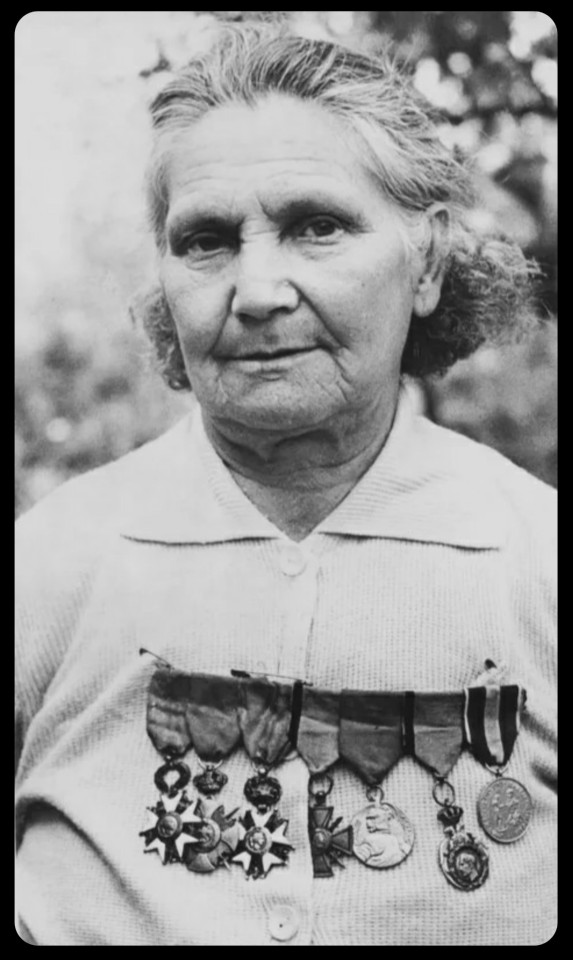
Serbia, 1972: Milunka Savić proudly displaying some of her medals in 1972, when her story became more widely known
It wasn't until the early 1970s that her involvement with the military finally began to receive more widespread attention, both in Serbia and abroad. Following the 1972 publication of an article that told her story, her local community in Belgrade quickly rallied to provide her with newer, more suitable living arrangements.
Sadly, she passed away within just a year of the article's publication.
In 2013, Milunka Savić's remains were relocated from the small mausoleum where they had been interred since 1973, and she was reburied in Belgrade's "Alley of the Greats," where some of the most well-known and most widely respected Serbians are laid to rest.
Sources & More Info:
Research Gate: Milunka Savić: the Forgotten Heroine of Serbia
Girl Museum: Milunka Savić
Law and Politics: The Position of Women in the Serbian Army
Medium: The Fearless Woman-Bomber Who Died Proud, Broke, and Forgotten
Wikipedia: Milunka Savić
Mental Floss: The Serbian "Great Retreat" Begins (WWI Centennial)
#history#Milunka Savić#women in history#serbia#women in the military#balkans#military history#wwii#wwi#yugoslavia#milunka savic#challenging gender norms#feminism#femininity#serbian history#women's liberation#women in war#real-life mulan
134 notes
·
View notes